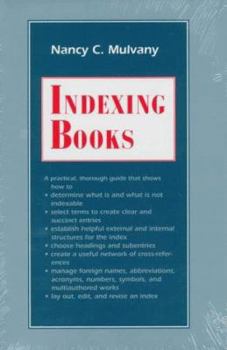Indexing Books
Indexing Books will be welcomed by authors and professional indexers as a much-needed guide to index preparation that is thorough, accessible, well organized, and up-to-date. Nancy C. Mulvany builds on various style guides, particularly The Chicago Manual of Style's extensive chapter on indexing. She expands its treatment of mechanics with more in-depth discussions of analysis and editorial judgment calls--deciding what is and what is not indexable, and establishing the structure of entries. She also discusses the concept of indexing and how it fits into the publishing process; deciding when to prepare one's own index and when to hire a professional; deciphering publishers' indexing guidelines; and choosing appropriate software. Mulvany's evaluation of available embedded and dedicated software is especially useful as a current guide to what works best for which tasks. While she advocates use of computers for certain tasks, she demonstrates that no software can replace the analysis provided by a good indexer. Appendixes provide a worksheet for general index specifications, the table of ASCII characters, tables of commonly used generic characters, and a list of additional resources. The most extensive and up-to-date reference available, this will become the standard indexing guide for authors, technical writers, editors, beginning and advanced professional indexers, and all others involved in writing and publishing nonfiction books. This practical and thorough guide to indexing shows how to determine what is and what is not indexable, select terms to create clear and succinct entries, establish the external and internal structures of entries, choose headings and subentries, cross-reference, manage foreign names, abbreviations, acronyms, numbers, and multiauthored works, lay out an index, and edit an index.
Format:Hardcover
Language:English
ISBN:0226550141
ISBN13:9780226550145
Release Date:May 1994
Publisher:University of Chicago Press
Length:336 Pages
Weight:1.28 lbs.
Dimensions:1.1" x 5.5" x 8.5"
Customer Reviews
5 ratings
Anyone who wants to self-publish should read this!
Published by Thriftbooks.com User , 15 years ago
Like writing, indexing is an art form. Some people can do it, and some people can't. If you want to attempt your own index, buy Mulvany's book. She's an instructor of index courses and she knows her stuff-- it shows. Notice how this book has ZERO negative reviews. The only complaint that I had was the price, but you really get what you pay for, so how can you complain when you buy the best? She should trademark the definition of the "Ideal Index"; it's a must read. She covers structure, arrangement, names, everything. It's all there.
Essential Guide to Learn how to index
Published by Thriftbooks.com User , 19 years ago
Mulvany's Indexing guidebook is a must have for anyone seeking to become an indexer. I purchased the book in connection with the United State Deparment of Agriculture Basic Indexing course that I am taking.
You're an indexer? You should have this book
Published by Thriftbooks.com User , 22 years ago
Mulvaney's "Indexing Books" is one of the two books most recommended by professional indexers (the other being the indexing chapter from the "Chicago Manual of Style"). Mulvaney writes in easy to understand, no-nonsense language to first explain what is an index, why you need a professional indexer (vs. say, a computer program), and then goes into detail about how to index books. "Indexing Books" is a must-have for anyone wanting to be a professional indexer.
Practical and valuable guide to indexing
Published by Thriftbooks.com User , 23 years ago
This helpful book was invaluable when I had to prepare an index for my book. The author knows her stuff and clearly explains what to do and--just as important--precisely how to do it. If you are indexing your own book, and you really want readers to get the most from your work, this is the guide for you.
Turned me into an indexer!
Published by Thriftbooks.com User , 27 years ago
I just recently finished co-authoring my first full-length book. It is an extremely technical medical manual, and my co-author and I decided that we needed to do the indexing ourselves, both to aid in document debugging and because, as the authors, we understand the material in a way that even a medical indexer would not. I bought this book, read it twice and underlined it, took a deep breath, and then plunged ahead. We made a couple of newbie errors early on, but Mulvany helped keep us on the true path. And the index turned out very well.





